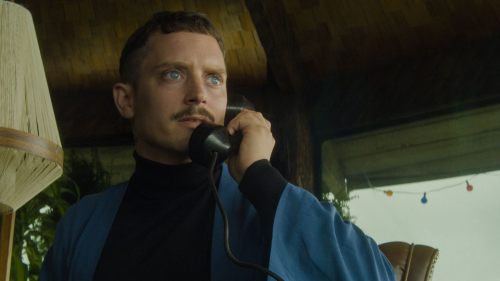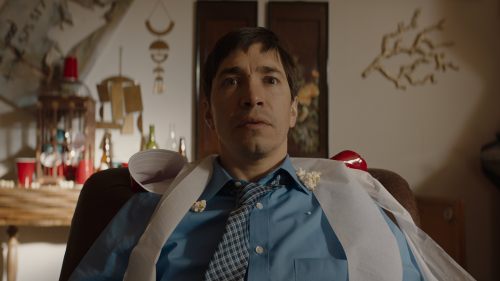Fantastic Fest Review: IN FABRIC Is A Beautiful Synthetic Blend
Subgenres like giallo, European horror, and exploitation typically created a heightened experience. Instead of reflecting a livable reality, they amplify specific ideas and feelings: sexuality, violence, fear, desire.
In Fabric, the new film from The Duke of Burgundy and Berberian Sound Studio director Peter Strickland, does more than amplify, and goes beyond appropriating the aesthetics of those subgenres. It lovingly wraps giallo and Euro-horror like a satin sheath around emotionally alive, even sympathetic characters.
This movie is more difficult to pin down than either of Strickland’s last two features. It is a disorienting collision between somewhat realistic characters, and elements such as automaton-like witches, baroque dialogue, and, uh, an evil dress. Strickland fosters a collision of worlds, a synthetic blend of reality and fantasy with a dry and vicious wit. The result is a uniquely persuasive vehicle for ideas about the relationships between commerce, products, desire and personal identity.
An early image featuring two complementary ideas builds a thematic arch over the whole movie. In a newspaper featuring a page-one story about thriving post-holiday retail sales, an ad for fancy dress boutique Dentley & Soper’s sits next to columns of personal ads. Everything boils down to objects and retail; personal possessions and identity become the same thing.
One of those ads is placed by Sheila, a middle-aged woman played with magnificent gravity by Marianne Jean-Baptiste. Sheila might even identify as an object; when answering the phone she doesn’t give a name, but rattles off a string of numbers.
In preparation for a date, Sheila heads to Dentley & Soper’s, where the saleswomen might have been pulled from a Suspiria section of Westworld. They engage in sexual, possibly Satanic rituals with mannequins. Their sales pitch is a maze of exaggerated phrases like “a purchase on the horizon, a panoply of temptation. Can a curious soul desist?” But the pitch works; Sheila walks away with a flattering red dress.
About that dress. Is it alive? Is it dangerous? Maybe, and maybe. In Fabric certainly suggests “yes” to both, but this movie is delightfully ambiguous when it comes to any explicit definition of reality. The dress leaves a mark, emotionally and even physically, but perhaps the problem is really our tendency to define ourselves through objects.
Sheila may not be the first owner of the dress, but she’s the first we see. She’s navigating an unseemly divorce, and dealing with a freeloading son Vince (Jaygann Ayeh), whose dominatrix-like girlfriend (Gwendoline Christie) needles Sheila with emotional power games.
The dress passes from Shiela to a milquetoast man (Leo Bill) whose friends and co-workers walk all over him, and then to his trashy fiancee Babs (Hayley Squires), whose personality isn’t a fit for the customer base of Dentley & Soper’s. Each person experiences a bizarre crisis, and a breakdown of domesticity. (One brilliant consistent image for the latter is a washing machine thrashing itself to pieces while trying to wash the dress.)
As the dress floats through the film’s anthology-like structure, a few elements recur. Strickland regular Fatma Mohamed plays the primary Dentley & Soper’s saleswoman with the control of a fetish queen. Her character turns empty retail promises into witchcraft, as she purrs “I predict the fantasy” to goad Sheila into a purchase — implying that Sheila will get whatever she wants out of her date. And there’s a pair of bank managers who set unusual career goals and go into an almost sexual reverie when people describe their dreams.
None of which really captures how far outside any typical genre parameters In Fabric really is. Peter Strickland is going even weirder and more granular than he was in The Duke of Burgundy; this film demands, and rewards a close viewing. Sure, tell friends about the wild “killer dress” movie, but only because that trips off the tongue a lot easier than “subversively provocative meta-thriller about the perils of object-based definitions of personal identity in the late stages of capitalism.”



